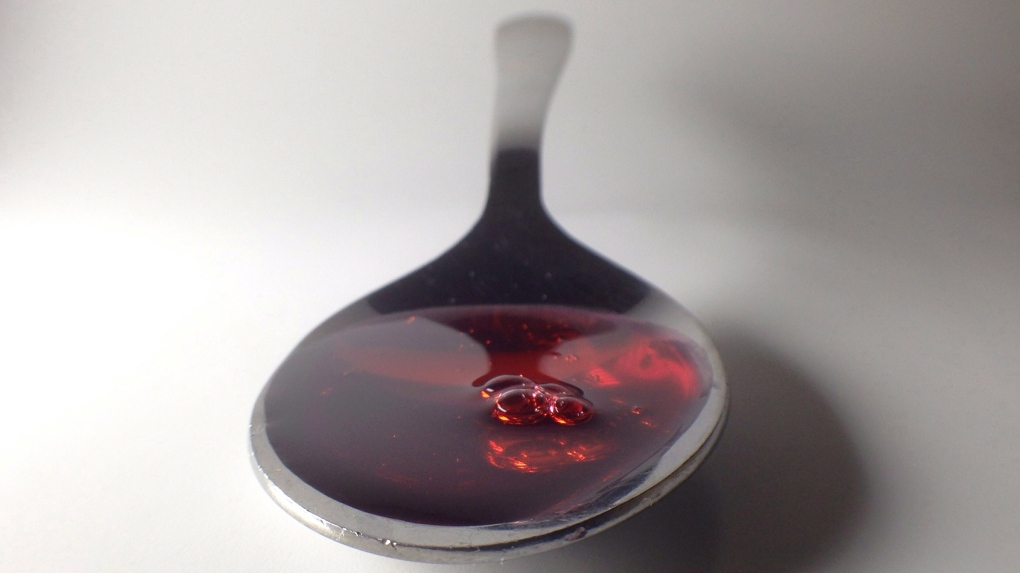
Are you proud to be Canadian? Poll suggests that feeling is dwindling
A new poll suggests the vast majority of Canadians are proud of their home and native land, but our sense of national pride is lower than it was a few years ago.
Following the deaths of more than 300 children from contaminated cough syrups in several countries, Health Canada says it's been more than a decade since similar cases were identified here.
The children died in 2022 in Gambia, Indonesia and Uzbekistan after taking over-the-counter cough syrups tainted with high levels of diethylene glycol and ethylene glycol.
"These contaminants are toxic chemicals used as industrial solvents and antifreeze agents that can be fatal even taken in small amounts, and should never be found in medicines," the World Health Organization (WHO) warned in a statement this week. "Since these are not isolated incidents WHO calls on various key stakeholders engaged in the medical supply chain to take immediate and coordinated action."
According to the WHO, at least seven countries may be impacted, including the Philippines, Timor Leste, Senegal and Cambodia. The contaminated cough syrups appear to have been manufactured in India and Indonesia. Most of the victims were under the age of five and died from acute kidney injury.
In a statement to CTVNews.ca, a Health Canada spokesperson said there is no reason for alarm in Canada.
"Health Canada has not received any complaints or similar reports related to glycol contamination in cough and cold syrups," a Health Canada spokesperson told CTVNews.ca. "In 2022, the Department was made aware of this issue by international regulatory partners and conducted a thorough assessment which did not identify any Canadian impact."
The spokesperson added that Health Canada has not received a report of serious adverse reactions related to glycol-contaminated medicines for more than 10 years.
"Canadian companies must ensure that the drug products that they sell in Canada comply with Health Canada's stringent regulatory requirements for safety and quality," the spokesperson explained. "These requirements apply whether the drug products are manufactured domestically or abroad."
All drugs that are manufactured or imported for sale in Canada are subject to the Food and Drugs Act, and the Food and Drug Regulations, which are overseen by Health Canada. To get a licence to import drugs into Canada, foreign production sites must also demonstrate their compliance with Good Manufacturing Practices (GMP), which is a system of international quality standards. Cases of potential non-compliance with Canadian standards and regulations can be investigated by Health Canada with the help of the Canada Border Services Agency.
Health Canada encourages anyone who has information about the sale or advertising of “non-compliant” products to report it using the "Health Product Complaint Form" form, available at healthycanadians.gc.ca.
With files from Reuters

A new poll suggests the vast majority of Canadians are proud of their home and native land, but our sense of national pride is lower than it was a few years ago.
Several people were injured Saturday night after a man allegedly stole an occupied RV during a police chase at a campground in Lloydminster.
A crowd of around 100,000 people were treated to a surprise appearance from a B.C. star during Coldplay’s set at Glastonbury Festival in England this weekend.
A B.C. man who reneged on a deal to split the cost of removing a tree with his next-door neighbour is now on the hook for the whole amount, B.C.’s civil resolution has ruled.
A strike by WestJet plane mechanics forced the airline to cancel hundreds more flights on Sunday, upending the plans of roughly 110,000 travellers over the Canada Day long weekend and prompting the carrier to demand action from the federal government.
Scientists may be a step closer to that reality, thanks to new research that has identified six subtypes — or 'biotypes' — of major depression via brain imaging combined with machine learning.
Most of us have felt the freedom and delight that comes with stripping down to a swimsuit on a sunny day and wading into a cool sea, the horizon twinkling in the distance.
Unconfirmed reports say American rapper and producer Kanye West is visiting Moscow. If true, it would make West the first major American celebrity to visit Moscow since the start of Russia’s invasion of Ukraine in February 2022.
Toronto police say they're investigating a pair of suspected hate-motivated offences after two city synagogues were damaged early Sunday morning.

When Zhya Aramiy was living in Turkey and Iraq, he had to keep his Pride flags hidden away.
A rave at the Ontario Science Centre was the place where Greg LeBlanc says his relationship first began with his husband Mark in 1997.
Travellers flying with WestJet continue to watch as the airline cancels more flights due to a sudden strike by its mechanics union.
The remains of a soldier from Newfoundland killed in the battlefields of France during the First World War will be laid to rest in St. John's Monday, bringing an emotional end to a years-long effort in a place still shaken and forever changed by the bloodshed.
The city is entering the final stages of resuming water service through its repaired feeder main, as water consumption continues to fall below the city’s threshold level.
A grandfather and grandson duo proudly graduated alongside each other at the same northern Manitoba school.
A large basking shark was captured close to the shoreline on Nova Scotia's Eastern Shore.
The world's largest hockey stick could soon become the world's most in-pieces hockey stick as a Vancouver Island community prepares to tear down and carve up the Canadian landmark.
For half a decade, a Saskatoon family has been trying to bring their orphaned niece to Canada, they say now it’s a matter of life or death.
 A spoonful of cough syrup is shown in Toronto, Saturday, Jan.25, 2014. (THE CANADIAN PRESS/Graeme Roy)
A spoonful of cough syrup is shown in Toronto, Saturday, Jan.25, 2014. (THE CANADIAN PRESS/Graeme Roy)